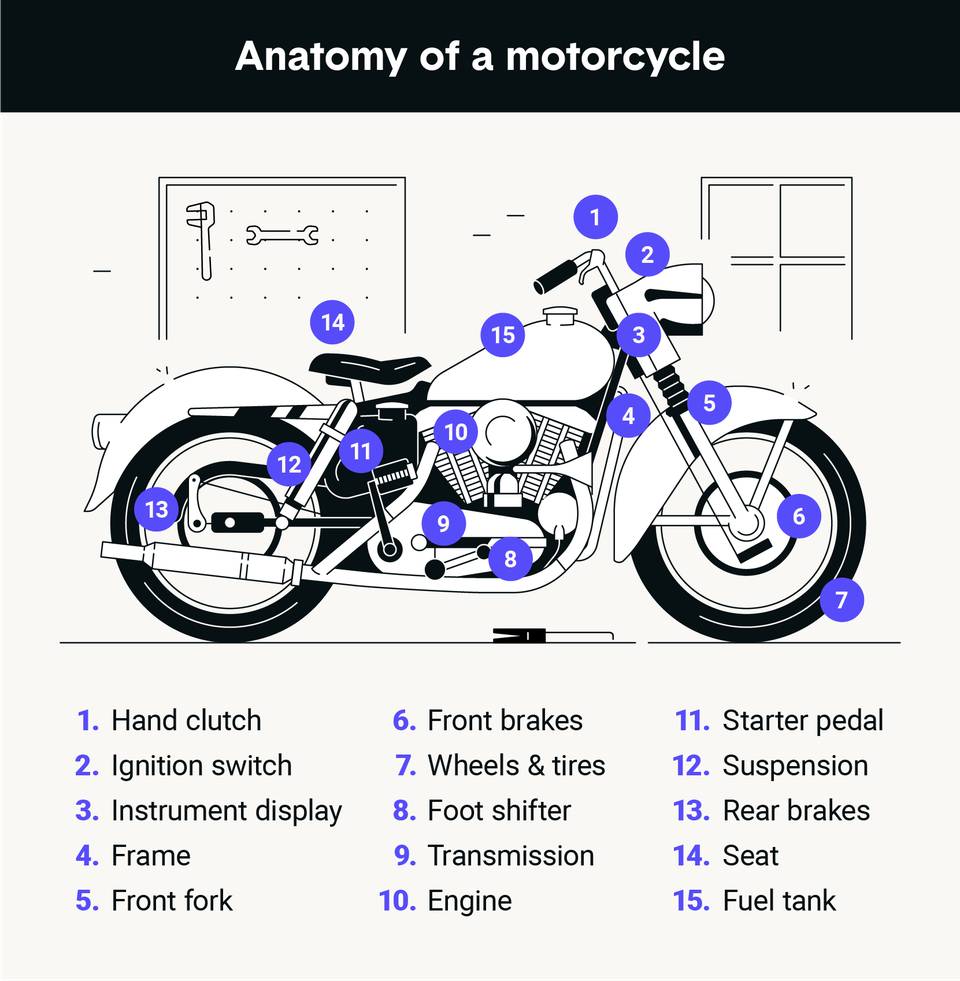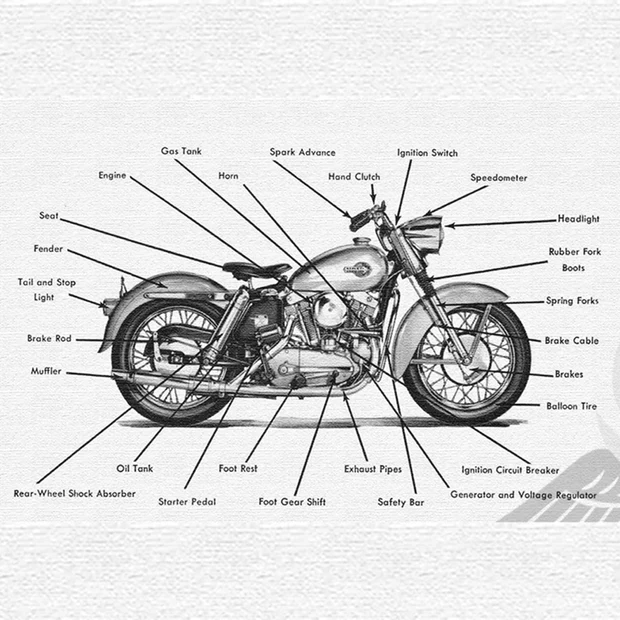Where to Buy Trusted Bike Parts Wellington Online Without Regret
Where to Buy Trusted Bike Parts Wellington Online Without Regret
Blog Article
Discover the Crucial MotorBike Parts You Need for Optimal Performance
Comprehending the important parts of a motorbike is basic for achieving peak efficiency. Each component, from the engine to the braking system, plays an important function in overall performance and safety and security. Normal upkeep can prevent unanticipated failings and enhance the riding experience. Many cyclists ignore the intricacies of these systems. Uncovering exactly how they work with each other can cause a more efficient adventure. What important elements should every rider prioritize?
The Engine: The Heart of Your Motorbike
The engine works as the core part of a bike, driving its performance and specifying its capabilities. It is responsible for transforming fuel into power, which powers the bike onward. Different sorts of engines are utilized, consisting of single-cylinder, V-twin, and inline configurations, each offering distinctive features matched for various riding functions and designs. The engine size, commonly measured in cubic centimeters (cc), significantly affects efficiency, with larger engines usually giving more power and torque.Furthermore, the engine's design and technology, such as gas shot systems or air-cooling versus liquid-cooling, affect efficiency and integrity. Maintenance is crucial for peak procedure; elements like regular oil adjustments and monitoring trigger connects guarantee long life. Motorcyclists typically consider an engine's responsiveness and level of smoothness, as these characteristics boost the general riding experience. Ultimately, the engine continues to be an essential aspect that defines not just the motorcycle's efficiency however also the rider's connection to the device.
The Transmission: Moving Gears Smoothly
The transmission plays a necessary role in a motorcycle's performance, especially in the mechanics of equipment moving. Recognizing exactly how to change equipments efficiently can improve the general riding experience, while regular maintenance assurances peak functionality. Appropriate interest to these elements can significantly influence the long life and performance of the motorbike.

Gear Shifting Mechanics
Smooth gear shifting is necessary for excellent motorcycle performance, considerably affecting both acceleration and control. The technicians of equipment changing include the interaction in between the clutch, gear lever, and transmission system. When a motorcyclist involves the clutch, it disengages the engine from the transmission, enabling a gear modification without damaging the parts. A well-timed launch of the clutch, incorporated with specific activity of the gear bar, helps with a seamless modification between gears. This procedure assures that the engine operates within its best power band, enhancing performance. Bike Parts Wellington. Additionally, understanding the gear ratios and their result on rate and torque can aid motorcyclists make informed selections during shifts, ultimately adding to a more receptive and satisfying riding experience
Upkeep Tips Importance
Regular upkeep plays a vital role in assuring that the transmission system operates successfully, enabling for smooth gear changes. Consistently inspecting and changing the transmission fluid is vital, as old liquid can lead to raised friction and wear. In addition, checking the clutch for wear guarantees peak involvement and disengagement, stopping slippage throughout equipment adjustments. Lubrication of moving components is similarly important to lower rubbing and enhance efficiency. Motorbike proprietors ought to likewise keep an eye on for leaks and unusual sounds, as these can show underlying problems. By sticking to these upkeep suggestions, bikers can prolong the life-span of their transmission system, guaranteeing that gear changes stay seamless and adding to the general performance of their motorcycle.
The Braking System: Ensuring Safety And Security on Every Experience
Braking systems are essential components that straight affect a motorbike's safety and efficiency. They contain numerous parts, consisting of brake pads, rotors, calipers, and hydraulic lines, all functioning together to assure efficient deceleration. The kind of stopping system-- usually either disc or drum-- affects responsiveness and quiting power.Regular upkeep is important to support peak efficiency; worn brake pads can cause decreased performance and enhanced quiting ranges. Additionally, the top quality of brake fluid must be kept an eye on, as it can soak up moisture gradually, compromising braking efficiency.Riders must also think about the relevance of anti-lock braking systems (ABDOMINAL), which protect against wheel lockup during sudden quits, enhancing general safety. Properly working brakes are not just concerning stopping; they instill self-confidence in the cyclist, allowing for more secure navigating through different terrains. Ultimately, a dependable braking system is important for delighting in every experience with satisfaction.
The Suspension: Enhancing Convenience and Control
A well-functioning suspension system considerably adds to a motorbike's overall performance, enhancing the performance of the stopping system. The suspension plays a considerable function in taking in shocks from unequal surfaces, ensuring a smoother trip while preserving tire contact with the roadway. This call is crucial for both security and control, enabling riders to browse edges with confidence and precision.Different types of shock absorber, such as telescopic forks or mono-shocks, use differing levels of convenience and handling. Appropriately tuned suspension enhances OEM Parts New Zealand responsiveness, providing the cyclist with a much more connected feel to the motorbike. Normal upkeep checks are very important to identify the suspension components, including springtimes and dampers, are working at their best. An efficient suspension system not just raises the riding experience however likewise adds to the durability of various other motorcycle components by minimizing deterioration. Consequently, purchasing high quality suspension is vital for any kind of severe motorbike lover.
The Tires: Connecting You to the Roadway
Tires play a necessary function in a motorcycle's performance, serving as the key web link in between the roadway and the rider. Recognizing the different kinds of tires readily available can considerably impact taking care of and safety. Furthermore, normal maintenance is crucial to assure peak tire performance and durability.
Tire Keys In Explained
Just how do different tire kinds affect a motorbike's performance? Tire types play a vital role in determining a motorcycle's handling, grasp, and security. Sport tires, created for high efficiency, offer boosted traction and responsiveness on paved roads, making them ideal for racing and aggressive riding. Alternatively, visiting tires focus on sturdiness and convenience, giving a smoother ride for long-distance travel. Off-road tires, defined by their rugged step patterns, excel in traction on unpaved surfaces, suitable for journey fanatics. In addition, dual-sport tires mix attributes from both on-road and off-road classifications, satisfying flexible riding requirements. Ultimately, selecting the best tire type is important for optimizing performance, guaranteeing security, and enhancing the overall riding experience.
Maintenance Tips Offered
While riding when traveling, maintaining optimal tire problem is essential for safety and performance. On a regular basis examining tire stress is very important, as under-inflated tires can lead to bad handling and boosted wear. It is a good idea to examine tread depth frequently; worn tires compromise grasp and stability. Furthermore, cyclists must try to find signs of damages, such as bulges or cracks, which can show the need for substitute. Turning tires periodically assures even put on, enhancing longevity. Keeping tires tidy from debris and preventing excessive visuals can prolong their life expectancy. Preserving correct alignment and balance adds to come to a head performance, lessening stress on various other bike components. Sticking to these upkeep suggestions will greatly boost the overall riding experience.
The Gas System: Sustaining Performance and Effectiveness
The gas system plays an essential function in making best use of a motorbike's performance and effectiveness, as it assures the optimal shipment of fuel to the engine. It makes up a number of vital parts, consisting of the fuel tank, fuel pump, fuel filter, and fuel injectors or carburetor. Each part needs to work successfully to assure a powerful and smooth ride.The gas tank shops gasoline and provides it to the engine via the fuel pump, which generates the necessary pressure. A fuel filter prevents contaminants from entering the engine, while the injectors or carburetor mix gas with air for combustion.Proper upkeep of the gas system is critical; a clogged up filter or malfunctioning injector can lead to decreased performance and increased gas intake. By validating that the gas system runs effectively, motorcyclists can enjoy enhanced throttle feedback, much better fuel economy, and in general improved riding experience.
The Electrical System: Powering Your Experience
A reliable electrical system is vital for the total functionality and safety and security of a motorcycle, as it powers vital elements such as the web ignition, lights, and different digital systems. This system consists of the battery, which stores energy, and the generator, accountable for creating power while the engine runs. The circuitry harness connects these elements, making sure dependable power distribution.Additionally, integrates safeguard the system from overloads, while relays help regulate high-current gadgets with low-power signals. A well-kept electric system boosts performance by making sure smooth starts and regular operation of lights and signals, essential for motorcyclist exposure and safety.Regular checks of the battery's cost and links are necessary for preventing electric failings. Bikers must likewise inspect circuitry for wear and tear, making sure all elements operate ideally. Inevitably, a robust electrical system adds significantly to the total performance and dependability of the motorcycle.
Often Asked Questions
Exactly how Commonly Should I Replace My Motorbike's Battery?
The frequency of bike battery replacement depends upon usage and maintenance (Motorbike Components NZ). Normally, batteries need to be replaced every 3 to 5 years. Normal checks can help identify when a replacement is necessary for peak performance
What Devices Do I Required for Standard Bike Maintenance?
For fundamental motorcycle find here maintenance, one requires important devices such as a socket set, wrenches, screwdrivers, pliers, tire pressure gauge, and a torque wrench. These devices promote effective upkeep and assure the bike runs successfully and safely.
How Can I Boost My Bike's The rules of aerodynamics?
To enhance motorbike aerodynamics, one should consider changing fairings, making use of windshield extensions, optimizing body placement, and reducing total weight. These adjustments help minimize drag, improving security and fuel efficiency during rides.
What Are the Signs of a Failing Electrical System?
Signs of a failing electrical system consist of lowering lights, problem starting, irregular instrument readings, and blown fuses. Motorbike Components NZ. Unusual smells or corrosion around battery terminals might additionally show underlying problems needing immediate focus for safety and security and efficiency

Exactly how Do I Pick the Right Oil for My Motorbike?
When choosing oil for a bike, one must think about the manufacturer's specifications, viscosity ratings, and the kind of riding. Additionally, traditional versus synthetic oil can affect performance and engine security, influencing the decision considerably. The engine dimension, generally measured in cubic centimeters (cc), considerably influences performance, with bigger engines normally offering more power and torque.Furthermore, the engine's design and technology, such as fuel shot systems or air-cooling versus liquid-cooling, influence efficiency and reliability. A well-functioning suspension system substantially contributes to a motorcycle's total efficiency, complementing the effectiveness of the braking system. The gas system plays an important duty in optimizing a motorcycle's performance and effectiveness, as it assures the optimal shipment of fuel to the engine. A fuel filter avoids contaminants from entering the engine, while the injectors or carburetor mix gas with air for combustion.Proper maintenance of the gas system is critical; a stopped up filter or malfunctioning injector can lead to reduced efficiency and increased fuel consumption. A properly maintained electric system enhances performance by making sure smooth begins and regular operation of lights and signals, crucial for biker presence and safety.Regular checks of the battery's charge and links are important for stopping electric failings.
Report this page